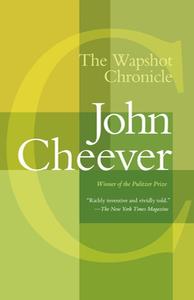 Novelist and short story writer John Cheever (1912-1982), sometimes called the "Chekhov of the suburbs," set much of his work in Manhattan's Upper East Side, the Westchester suburbs or New England villages around Quincy, Mass. His most famous short stories include "The Enormous Radio," "Goodbye, My Brother," "The Five-Forty-Eight," "The Country Husband" and "The Swimmer," most of which were first published in the New Yorker. Cheever also wrote four novels: The Wapshot Chronicle (1957), The Wapshot Scandal (1964), Bullet Park (1969) and Falconer (1977). A short story collection, The Stories of John Cheever, won the 1979 Pulitzer Prize for Fiction and a National Book Critics Circle Award, and its paperback version won a National Book Award in 1981. His final work was the novella Oh What a Paradise It Seems (1982). Cheever received a National Medal for Literature by the American Academy of Arts and Letters six weeks prior to his death from cancer in 1982. His daughter, writer Susan Cheever, revealed her father's bisexuality in her 1984 memoir, Home Before Dark.
Novelist and short story writer John Cheever (1912-1982), sometimes called the "Chekhov of the suburbs," set much of his work in Manhattan's Upper East Side, the Westchester suburbs or New England villages around Quincy, Mass. His most famous short stories include "The Enormous Radio," "Goodbye, My Brother," "The Five-Forty-Eight," "The Country Husband" and "The Swimmer," most of which were first published in the New Yorker. Cheever also wrote four novels: The Wapshot Chronicle (1957), The Wapshot Scandal (1964), Bullet Park (1969) and Falconer (1977). A short story collection, The Stories of John Cheever, won the 1979 Pulitzer Prize for Fiction and a National Book Critics Circle Award, and its paperback version won a National Book Award in 1981. His final work was the novella Oh What a Paradise It Seems (1982). Cheever received a National Medal for Literature by the American Academy of Arts and Letters six weeks prior to his death from cancer in 1982. His daughter, writer Susan Cheever, revealed her father's bisexuality in her 1984 memoir, Home Before Dark.
Cheever's debut novel, The Wapshot Chronicle, follows the eccentric Wapshot family, who live in a Massachusetts fishing village and share certain autobiographical aspects of Cheever's life, including a bisexual son. It was ranked 63rd on Modern Library's list of the 100 best English-language novels of the 20th century. A sequel, The Wapshot Scandal, follows a Wapshot wife who runs off to Italy with a 19-year-old A&P bag boy. Both books are available today in new paperback editions from Vintage International ($16.95). --Tobias Mutter

